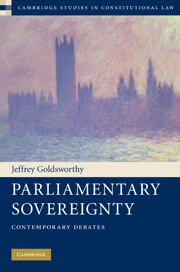Book contents
- Frontmatter
- Contents
- Detailed table of contents
- Acknowledgments
- 1 Introduction
- 2 The myth of the common law constitution
- 3 Legislative sovereignty and the rule of law
- 4 Homogenising constitutions
- 5 Abdicating and limiting Parliament's sovereignty
- 6 Trethowan's case
- 7 Requirements as to procedure or form for legislating
- 8 Judicial review, legislative override, and democracy
- 9 Parliamentary sovereignty and statutory interpretation
- 10 Challenging parliamentary sovereignty: Past, present and future
- Index
- References
6 - Trethowan's case
Published online by Cambridge University Press: 05 October 2010
- Frontmatter
- Contents
- Detailed table of contents
- Acknowledgments
- 1 Introduction
- 2 The myth of the common law constitution
- 3 Legislative sovereignty and the rule of law
- 4 Homogenising constitutions
- 5 Abdicating and limiting Parliament's sovereignty
- 6 Trethowan's case
- 7 Requirements as to procedure or form for legislating
- 8 Judicial review, legislative override, and democracy
- 9 Parliamentary sovereignty and statutory interpretation
- 10 Challenging parliamentary sovereignty: Past, present and future
- Index
- References
Summary
Introduction
Trethowan's case is among the most important and influential constitutional cases decided in any jurisdiction of the British Commonwealth. It was the first major case to deal with a problem common to many of these jurisdictions, including Britain itself: namely, whether, and to what extent, a Parliament can control or even restrict the future exercise of its own legislative power. The problem includes, for example, whether a Parliament can make the future enactment of legislation conditional on its being passed by super-majorities in Parliament, or by a majority of electors in a referendum. Moreover, the ingenious arguments put forward in the case, and adopted in various judgments, proposed novel solutions to the problem that have greatly influenced constitutional thought, throughout the Commonwealth, ever since. They are generally acknowledged to have inspired new theories of Parliamentary sovereignty, which are more amenable to Parliaments being able to bind themselves in these ways. But, however beneficial its consequences may have been, the decision in the case was almost certainly wrong as a matter of law. It is an example of creative judicial statecraft surmounting legal obstacles in the interests of good government.
Background
In the early part of the twentieth century, members of Upper Houses in State Parliaments were either elected on a restricted property franchise, or (in New South Wales and Queensland) appointed for life by the Governor. Consequently, they ‘were more patrician than democratic in character, their membership reflecting the interests of wealth and privilege’.
- Type
- Chapter
- Information
- Parliamentary SovereigntyContemporary Debates, pp. 141 - 173Publisher: Cambridge University PressPrint publication year: 2010



